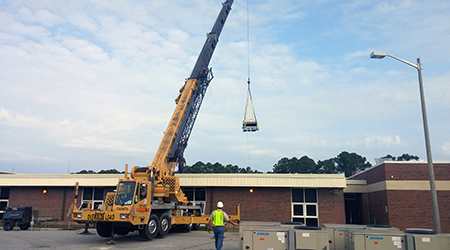
Tailoring HVAC Upgrades to Tight Facility Needs
March 11, 2016
Students thrive in clean, quiet and comfortable learning environments. Daikin contributed to such a setting in an energy-saving HVAC upgrade at Achilles Elementary School in Hayes, Va., one of nine facilities operated by the Gloucester County Public School District. While a large wing was added to Achilles about a decade ago, classrooms in the original 1960s-built section were in need of a mechanical upgrade, including replacing the existing HVAC equipment.
“In our market, we normally don’t specify rooftops on a job like this, but low clearances between the roof and ceilings necessitated rooftop units to replace exterior wall-mounted unit ventilators,” says Matthew Haltiner, LEED AP, senior associate with Thompson Consulting Engineers in Hampton, Va. “The owner is happy with Daikin equipment in its other schools, and we designed this system for that brand continuity and owner satisfaction.”
After the engineering and school facility teams determined that a single-zone rooftop solution was more cost-effective than using larger-capacity units with support weight considerations, the district selected Daikin Rebel variable air volume (VAV), single-zone units featuring cooling and heat pump modes with an inverter compressor.
“The single-zone, VAV operation made the installation more appealing and efficient for energy savings being we could do the single-zone for each of the classrooms,” Haltiner says. “The Rebel units are light and versatile enough to install on a roof with weight concerns.
“This has been a time-sensitive project in that we only had approximately eight weeks to do a major renovation. We removed all the unit ventilators and rewired circuits to ensure the new rooftop units meet current standards,” says David Simmons, C.E.M., energy manager with Gloucester County Public Schools in Gloucester, Va. The district is a longtime Daikin customer.
The design of the new HVAC system allowed other mechanical and safety equipment to remain located in the tight ceiling areas. Ductwork underwent some re-design during the project. “Our main challenge was dealing with existing conditions of the tight ceiling spaces that contained piping, electrical, and communications lines,” says Christopher Brown, vice president of CB Plumbing & Mechanical in Camden, N.C., the installing mechanical contractor.
The rooftop units avoid overcooling or overheating spaces with a quiet inverter-driven variable speed compressor and modulating hot gas reheat to deliver the preferred air temperature while allowing the school to minimize use of its own propane fuel supply.
“This allows the school to use Rebel’s heat pump mode for energy-efficient heating until it’s too cold outside for heat pump operation, and then the Rebel units switch over to propane gas,” says Greg Prose, Daikin Applied representative and sales engineer with Hoffman & Hoffman in Chesapeake, Va. “The Rebels are the only rooftop units in the district that can do this and additionally, it’s an energy-saving feature. The units also have a zero to 100 percent economizer for economizer operation when possible.”
For additional energy savings and to ensure optimum indoor air quality (IAQ), a self-cleaning, no maintenance air purification system that uses bi-polar ionization technology was installed on each Rebel rooftop.
“We installed the bi-polar ionization to reduce the outside air to the space which reduces the total capacity from the system. It removes the need for an energy wheel and the exhaust fan associated with it,” Haltiner explains, noting a formula of 0.06 cfm per square foot plus 10 cfms per student was specified to meet or exceed the ASHRAE standard.
The Daikin Rebel units serve about 22,000 square feet of space, which includes 12 classrooms, two hallways and two computer labs. The Daikin Service Group completed start-up in mid-August 2015 by after some adjustment of the flashing on the curbs to accommodate the new rooftops, and units were commissioned by a third-party provider.
“The new Rebels are all on the roof with sound isolation foundations so you don’t hear them in the classroom, unlike the loud motors of the unit ventilators that were in the classroom,” Simmons says.
“The new Rebel units are easy to work with and user friendly,” Simmons says. Of the Daikin Service Group that started up the system and is working with the controls integrator, he adds: “The technicians from Daikin Service Group have been outstanding and right on the money. We receive very helpful, responsive service from the Richmond office.”
This Quick Read was submitted by Dan Hounsell, editor-in-chief of Facility Maintenance Decisions, dan.hounsell@tradepressmedia.com.
Learn more about K-12 retrofit strategies and funding considerations here.
Next
Read next on FacilitiesNet












